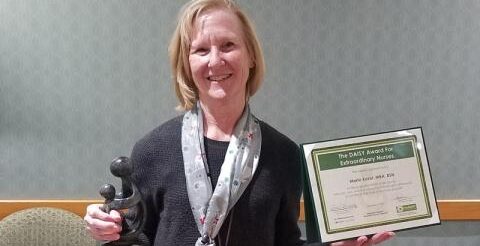‘Not Everyone Has a Marie’: Nurse Honored for Leadership and Innovation

“I’ve been blessed to work in two areas of the nursing profession that I absolutely fell in love with – women’s health and informatics,” said Methodist’s director of clinical informatics, Marie Kozel, MBA, BSN, RNC-BC.
Kozel’s nursing career spans decades, and she had found a home and leadership roles in women’s health. But in the early 2000s, Methodist began converting its electronic medical record (EMR) to a new platform – Cerner – a massive undertaking that steered Kozel’s career in a new direction when a clinical lead was needed for the project team.
“I’ve always had an interest in technology – that kind of brain and skill set,” she said. “One of my mentors recognized that and suggested I apply for the position.”
An 18-month role has turned into 18 years, and a department of three has grown to 33. Kozel’s career in nursing informatics – a field that focuses on improving information and communications in nursing – has made her an invaluable leader at Methodist, building relationships across the country and growing a national reputation for her work and innovation.
So when she was honored with The DAISY Award in December at Methodist Hospital, the only person who was shocked was Kozel. She called the award “the biggest surprise that I have ever experienced in either my personal or professional life.”
Maximizing Care, Minimizing Documentation
Kozel’s nomination started as a letter of praise to Teri Tipton Bruening, MSN, RN-BC, CNE, vice president of patient care and chief nursing officer at Methodist Hospital and Methodist Women’s Hospital. The nominator was Kansas City-based Cerner’s director and regional clinical executive Amye Gilio, DNP, MSN, RN-BC.
“I was just thinking about the people I support, and Marie stood out as somebody who’s so proactive as opposed to reactive,” Gilio said. “Oftentimes the health information technology (IT) nurse leader is that behind-the-scenes person. The volume of work that Marie does and how she ties that back to what nursing is wanting is just invaluable. She does a stellar job.”
In her letter, Gilio called Kozel a “self-starter” who “never lets the grass grow under her feet.”
That’s apparent even from Kozel’s education. She’s a Lamaze-certified child birth educator, a certified lactation consultant, an inpatient obstetrics-certified nurse and a certified informatics nurse. She also has an MBA and post-master’s certificate in nursing informatics.
“It’s always been important to me to make sure I have the same credentials as the individuals who I lead,” she said.
And even though she no longer cares for patients at the bedside, her work directly affects how they are cared for – on a much larger scale.
It’s work that’s having an impact during the COVID-19 pandemic, too. One example: Kozel collaborated with clinical leads to reduce documentation for COVID-19 patients in the EMR by 300 data fields – streamlining the information that nurses and respiratory therapists needed to record while maintaining what’s essential.
“She was minimizing nursing documentation to maximize the time that patients were getting nursing care, which is a big deal,” Gilio said.
Throughout the pandemic, Kozel has been asked by other health systems to share what’s been done at Methodist to streamline processes.
“I don’t care if they use our same idea,” Kozel said. “Why not share the wealth? Why should everybody have to reinvent their own wheel when somebody else has already done it and been successful?”
It’s just one example of how she still touches patients. And that experience directly caring for them is critical to her role today.
“I couldn’t do what I do today without having the clinical knowledge that comes from working at the bedside with patients,” she said. “So that’s invaluable to me as I work to enhance and design EMR systems to be as efficient as possible for staff and as a safe as possible for patients.”
“Focused on the Patient First”
At the end of the day, Kozel makes it easier for nurses across the health system to deliver the exceptional and compassionate care Methodist is known for. And while The DAISY Award so often goes to nurses caring directly for patients, Kozel’s honor is reflective of the impact that nurses in every role can have.
“It validates for me that even though I no longer have a direct bedside role, I’m still able to use my nursing knowledge to positively impact the quality of patient care and the efficiency of staff,” she said.
“Marie is always focused on the patient first and is asking questions about ways to improve our processes and increase patient and provider satisfaction and quality of care,” said Kent Sona, Methodist’s vice president of IT and chief information officer. “Marie is a great role model for others within the organization – the way she leads and interacts with her team and others; her communication skills and integrity; and her willingness to step up and help without question.”
Gilio puts it even more simply: “Not everyone has a Marie.”
